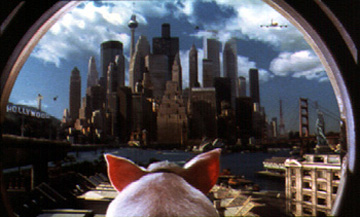|
|
Chapter Two:
|

|
Babe: Pig in the City acknowledges such a reality in its opening scene as the Narrator observes upon Babe and Farmer Hoggett's congratulatory parade back to the farm that "the first hazard for the returning hero is fame." Almost but not quite bordering on self-awareness, that comment encapsulates the reaction that the film provoked when compared unfavorably to Babe, as well as the film's reason for being. This will be about Babe's journey past the easily earned happy ending. While Babe is a fable with a tidy moral, Babe: Pig in the City is an acknowledgement that life can be messy, bad things can happen quite unexpectedly, and even those with good hearts and the best of intentions may find themselves overwhelmed by the crush of humanity. I have a soft spot in my heart for Babe and its soaring spirit, but its spawn is in many ways the more astonishing and invigorating of the two. New at BOP: Share & Save
![]() Tweet
Tweet
![]() Print this column
Print this column
Babe: Pig in the City is, it must be said, considerably more intense than the first Babe, showcasing set pieces that balance dark-humored plot points with a fair amount of frenetic action. Farmer Hoggett's dehabilitating accident in the well at the beginning - which it should be noted is done without the expected sound effects of blunt force head trauma and crushed fingers but with Roscoe Lee Browne's narration on the soundtrack to cushion the blow - sets the tone. The three key sequences in what follows out from there, Babe's pursuit around city streets by a vicious bull terrier, attempts by animal control to round up a hotel filled with a menagerie of animal species, and a vaudeville style circus act climax set among a swanky charity dinner are all intricately choreographed chases that straddle the line between exhilaration and despair, laughter and sadness. The Metropolis where this all takes place, with a skyline that deliriously and cheekily references iconic landmarks from nearly every continent is mean to be an everycity (or perhaps as the title indicates, THE city.)
All three of these passages also share moments that illustrate the size of Babe's heart and his willingness to push on through the heat of the moment - saving the bull terrier from certain watery death, finding a way to get a gasping goldfish back into the water or alerting a dexterous orangutan to make a save for a baby ape falling from an overhead chandelier.
|
Advertisement |
The changes in storyline and tone are perhaps a reflection of behind-the-scenes differences. George Miller, having produced and co-adapted the first Babe, stepped into the director's chair and spun an original tale far more concerned with the animals than with the humans. Despite some limited searching, I still can't determine if James Cromwell's significantly reduced part was in response to a desire not to make the sequel or if it simply reflects that the plot of Babe: Pig in the City has no room for him. Considering the ebullience and joy he brought to Babe and his nomination-worthy scene where a serenade to Babe turns into a spirited spontaneous jig, his absence is felt quite heavily and all the wonders of the second film can't quite make up for that. Miller's visual style, so strong in projects as diverse as The Road Warrior, Lorenzo's Oil and The Witches of Eastwick, is at its apex here. Scene after scene is crammed with invention and ingenuity and always a beating heart at the core. The climax is the most exhausting but least enjoyable sequence, although Miller deserves credit for allowing his vision for the film to unfold without compromise, and for ending with a most unlikely of chase scenes.
The voice actress for Babe also switched out, and in one of the more perfectly aligned coincidences in Hollywood history, one Rugrats actress (Christine Cavanaugh) was replaced by another (E.G. Daily). The differences between the two actually suit the change in plots as Cavanaugh's squeaky spunk is replaced with Daily's more tentative and weary tones.
By the final old-time camera iris out, Babe has once again found himself in his master's good graces, uncovered a way to help out the less fortunate simply by being true to himself, and discovered that yeah, "the city can really take it out of ya." Would that part of his triumph have resulted in yet another big-screen adventure.
Next time: He's Chevy Chase. And you're not.

|
|
|

|
Friday, November 1, 2024
© 2024 Box Office Prophets, a division of One Of Us, Inc.

